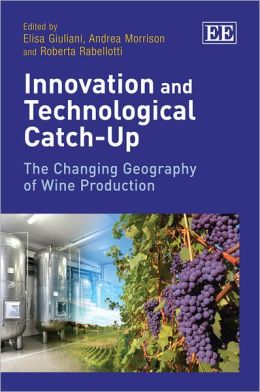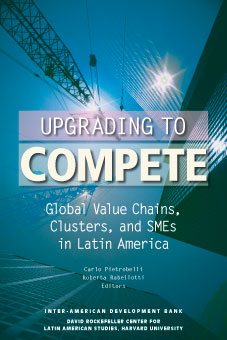My book about the changing geography of wine production

in In the Spotlight Tags: Argentina, Catch up, Chile, Innovation, Italy, South Africa, Wine industry

in Articles, Media Tags: Argentina, Catch up, Chile, Emerging Countries, Innovation, Italy, South Africa, Wine industry
I contributed to the Development Blog with an article on catch up in the wine industry.
in Journal Articles, Publications Tags: Catch up, Chile, Emerging Countries, Innovation, South Africa, Wine industry
Emerging economies are now becoming more central in global competition. To achieve this, many countries have invested to develop into ‘knowledge economies’. Universities have a role to play in this transformation, both as generators of new knowledge as well as actors that can interact with the local industry and contribute to its innovativeness. This paper explores, using two case studies in the Chilean and South African wine industry, how universities connect international science to domestic industry. It finds that this connection occurs through a few ‘bridging researchers’, who display particular characteristics compared with their colleagues. Bridging researchers are more ‘talented’ than average researchers, both because they publish more in international journals and/or because they have received awards for their academic work. This finding may have significant policy implications, as policies aimed at strengthening the skills of these researchers should be welcomed in catching-up industries.
in Articles, Media Tags: Argentina, Catch up, Chile, Emerging Countries, Innovation, Italy, South Africa, Wine industry
The Italian newspaper Sole 24 Ore published an article on my book on Innovation and Catching Up: The changing geography of wine production.
in Books, Publications Tags: Argentina, Catch up, Chile, Emerging Countries, Innovation, Italy, South Africa, Wine industry

Since the beginning of the 1990s, the supremacy of ‘Old World’ countries (France and Italy) in the international wine market has been challenged by new players, such as Australia, Argentina, Chile and South Africa, which are recording stunning performances in terms both of export volume and value. This book demonstrates that such a spectacular example of catch-up goes beyond simply copying new technologies; it entails creative adaptation and innovation, and introduces a new growth trajectory in which consistent investments in research and science play a key role.
«This book overturns the old paradigm ideas about natural-resource-based activities. It sheds light on the new opportunities for technological dynamism and catching-up by using science to open novel directions in traditional sectors. It should become a classic in what I expect will be a very important academic debate and a new trend in development policy.»
Carlota Perez
Tallinn University of Technology, Estonia; Cambridge University and University of Sussex, UK
«This excellent book demonstrates better than any other I know the strengths and limits of the concept of a national system of innovation for understanding economic development today. Any careful student of innovation or development will want to read it.»
Charles Sabel
Columbia Law School, USA
Here you can read the introduction,
The Changing Geography of Wine Production_Intro
Here you can read some reviews of the book,
regional studies,
AAG Review of Books,
Journal of Wine economics,
agriregionieuropa_n28,
Il Sole 24 Ore
You can buy the book here.
in Journal Articles, Publications Tags: Catch up, Chile, Innovation, Italy, South Africa, Wine industry
From a development perspective an investigation of the changes that have occurred in the wine industry is of particular interest because it provides evidence on how emerging economies have been able to acquire significant shares of the international market in a dynamic sector. Based on novel empirical evidence, this paper shows that emerging countries with diverse institutional models and innovation strategies have actively participated in the process of technological modernization and product standardization. These newcomers in the wine sector have responded particularly effectively to changes in demand, aligning emerging scientific approaches with institutional building efforts and successful marketing strategies.
in Presentations Tags: Catch up, Chile, Innovation, Italy, South Africa, Wine industry

I was invited at a panel on the Economics of Inter- Firm Catch Up discussing how global economic recession, can be an opportunity for late-comers to enter the market and catch up with forerunners.
Download the pdf, Pres World Knowledge Forum 2009-10
in Articles, Media Tags: Argentina, Catch up, Chile, Emerging Countries, Innovation, Italy, South Africa, Wine industry
Richard Feimberg reviewed my book edited with Pietrobelli.
in Books, Publications Tags: Brazil, Chile, Clusters, Global Value Chain, Latin America, Mexico, Nicaragua, Small and Medium Enterprises

This books investigates clusters and value chains in Latin America. Globalization imposes new conditions and rules for competitiveness in international markets. It poses the imperative to link up with other actors, both at the local and at the global level, and find new ways to interact and learn from the relationship. Can local markets and clusters represent a powerful alternative to global markets? Do transnational corporations and global buyers play a role and enhance or undermine local firms’ upgrading and learning? What opportunities do clustering and global value chains offer to SMEs in global markets?
Upgrading to Compete shows that both the local and the global dimensions matter at once. Clustering and collaborating with other local firms offers substantial advantages, while also participating in global value chains and interacting with foreign buyers and companies may enhance local firms’ capabilities and access to distant markets. However, what remarkably matters is the form of governance of value chains and clusters that importantly affects the upgrading process of local SMEs.
The book illustrates this with original empirical evidence from several clusters in Latin America. New case studies from Brazil, Chile, Mexico and Nicaragua are supplemented by desk studies on other experiences in the region.
«At a time when there is growing interest in Latin America on active production sector strategies and on the role of SMEs, Pietrobelli and Rabellotti make in this book an essential contribution. “Upgrading to Compete” is full of quality information and insights. I look forward for the introduction of many of the ideas and recommendations of this book into policy action.»
Jose Antonio Ocampo
Under-Secretary-General of the United Nations for Economic and Social Affairs
«This book offers a new way of thinking into fundamental aspects of industrial organization and international trade and exploits original case studies to develop new ideas and stylized facts.»
Michael Piore
David W. Skinner Professor of Political Economy, Massachusetts Institute of Technology
The book was reviewed in Foreign Affairs
You can buy the book here